Inder Verma

Inder M. Verma is a professor in the Laboratory of Genetics and holds the Irwin and Joan Jacobs Chair in Exemplary Life Science and American Cancer Society Professor of Molecular Biology. He received his PhD degree from the Weizmann Institute of Science, Rehovot, Israel in 1971, completed postdoctoral training with David Baltimore at Massachusetts Institute of Technology in 1974, and has been with the Salk Institute as Assistant Professor, Associate Professor and now Professor from 1974 to present. Dr. Verma is one of the world's leading authorities on the development of viruses for gene therapy vectors and uses genetically engineered viruses to insert new genes into cells that can then be returned to the body, where they produce the essential protein whose absence causes disease. Dr. Verma and Salk colleagues developed a gene therapy vector, based on a stripped-down version of HIV that can deliver genes to nondividing cells, which constitute the majority of the cells in our bodies. They have used this vector successfully to deliver the clotting factor gene to laboratory animals and to transfer a therapeutic gene to retinal cells to mice with an inborn deficiency. Dr. Verma's group is also studying two genes implicated in familial breast cancer, BRCA1 and BRCA2, and recently demonstrated that their action is linked to the cell's division cycle and that BRCA1 regulates gene activity. Dr. Verma's scientific contributions have been recognized by a number of honors, including one of 25 lifetime American Cancer Society Professorships (1990), an Outstanding Investigator Award from the NIH (1988), membership in the Third World Academy of Sciences (1995), the National Academy of Sciences, India (1997), the National Academy of Sciences, USA (1997), the Institute of Medicine (1999), a Fellow of the American Academy of Arts and Sciences (2000), an Associate Member of the European Molecular Biology Organization, EMBO (1998) and election to the American Philosophical Society (2006) Vilcek Foundation Prize (2008), ASGT Outstanding Achievement Award (2009) Spector Prize (2010), and the Pasarow Award in Cancer Research (2010).
Viruses as Allies of Man
At the beginning of the third millennium, man has anopportunity to fulfill the cherished goal of improving the lot of humankind. Newer modalities of medicine are being practiced and daily new breakthroughs are being reported. I would like to talk about gene therapy, a form of molecular medicine, which will have a major impact on human health. At present, gene therapy is being contemplated for both genetic and acquired diseases. These include hemophilia, cystic fibrosis, diabetes, cancer, Parkinson’s, Alzheimer’s, etc. In the case of genetic diseases, a wide variety of somatic, non-germinal tissues are being explored for the introduction of foreign genes with a view towards gene therapy. A prime requirement for successful gene therapy is the absence of any adverse effect on the recipient. A highly desirable delivery vehicle will be the one that can be generated at high amounts, integrate in non-dividing cells and have little or no associated immuneproblems. We have recently generated vectors based on a modified, non pathological,safe form of the AIDS virus that have the ability to introduce genes into both dividing and non-dividing cells. The vectors can introduce genes in a variety of cells and hosts. Our current, third-generation viral vectors are devoid of six viral genes and therefore we consider them to be safe vectors. Using third generation lentiviral vectors we can introduce genes directly into brain, liver, muscle, hematopoietic stem cells, and more recently retina and a number of tumor cells. Our data shows that lentiviral vectors can not only efficiently delivergenes, but also have long term sustained production of the foreign protein. We have not observed any untoward immunological consequences due to the vector. My talk will discuss the use of vectors for a wide variety of genetic and acquired diseases. Additionally I will discuss the use of these viral vectors for studying complex biological systems. Finally I will discuss the social and ethical implications of genetic approaches to human health.





